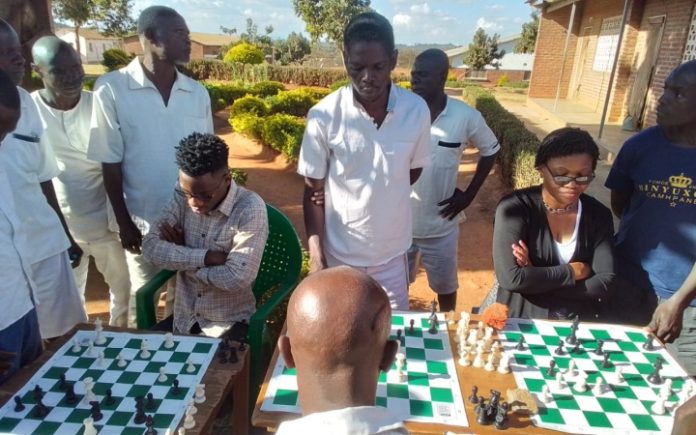Kenya has made a bold and transformative step by entering three teams in the fourth Intercontinental Chess Championship for Prisons.
The event, which began on Tuesday, October 8, 2024, showcases Kenya’s commitment to inclusivity and rehabilitation, as it competes in three categories: the Open Section, the Women’s Section, and the Youth Section.
The participation of Kenyan teams emphasizes the country’s dedication to using chess as a tool for social reintegration and mental well-being among inmates.

RECOMMENDED:
Inclusive Chess Categories Highlight Kenya’s Commitment
The three teams representing Kenya are all drawn from inmates at the Nairobi West Prisons facility.
The categories—Open, Women’s, and Youth—reflect Kenya’s inclusive approach to the event, ensuring that inmates from different backgrounds and demographics have the opportunity to participate.
Other African nations such as Malawi, Uganda, Tanzania, and South Africa are also taking part, making this a highly competitive and collaborative event.
Chess Kenya president Bernard Wanjala expressed his excitement about Kenya’s participation, noting that it aligns with a larger goal of utilizing chess as a rehabilitative tool.
The event demonstrates how sports, particularly chess, can be instrumental in enhancing inmates’ cognitive abilities and preparing them for a productive life beyond prison walls.
Chess as a Rehabilitation Tool: Kenya’s Broader Initiative
Kenya’s involvement in the championship is not an isolated event but part of a broader initiative spearheaded by Chess Kenya and The Gift of Chess, a non-profit organization dedicated to expanding access to the game within underserved communities, including prisons.
The aim is to promote positive mental engagement, develop critical thinking skills, and foster a sense of community among inmates.
“This program is made possible through a partnership between Chess Kenya and The Gift of Chess. The goal is to bring chess into correctional facilities, using it as a tool for cognitive development, problem-solving, and social reintegration,” Bernard Wanjala said.
Kenya’s commitment aligns with the global initiative of the FIDE Social Commission’s Chess for Freedom program, which has introduced chess in several correctional facilities worldwide. This program highlights the transformative power of chess, making it a valuable tool for improving inmates’ mental well-being and facilitating their personal development.
The Global Reach of the Intercontinental Chess Championship
The Intercontinental Chess Championship for Prisons is an international event that attracts participation from correctional facilities around the world.
The tournament’s objective is to enhance inmates’ cognitive skills, encourage positive mental engagement, and foster a sense of community through chess.
By taking part in this event, Kenya showcases its dedication to using chess as a means of rehabilitation, reinforcing its role as a transformative activity for inmates.
The championship serves as a platform for prisoners to engage in positive, mentally stimulating activities that promote problem-solving and critical thinking.
It’s a remarkable way for inmates to learn valuable skills that can help them reintegrate into society upon release.
Kenya’s participation underscores its commitment to constructive change and highlights the social and rehabilitative potential of chess.
Promoting Mental Health and Social Reintegration Through Chess
Chess Kenya’s efforts are not just about winning tournaments but about transforming lives. By promoting chess in correctional facilities, the organization aims to support inmates in building essential skills that can positively impact their future.
The initiative shows how chess can be used as a vehicle for change, enabling inmates to experience personal growth and develop a sense of accomplishment.
Kenya’s participation in the Intercontinental Chess Championship is a testament to the power of sports in creating opportunities for social change.
The championship provides an avenue for inmates to not only compete on an international level but also to connect with others from different parts of the world who share similar experiences.
The event fosters a sense of global community and support among participants, reinforcing the idea that rehabilitation is possible and achievable.
Chess for Freedom: A Partnership with FIDE
The Chess for Freedom program, under the FIDE Social Commission, has been instrumental in introducing chess to several correctional facilities in Kenya.
This initiative aims to enhance prisoners’ cognitive skills, boost their mental health, and provide them with tools for social reintegration.
The program’s success in Kenya demonstrates the country’s commitment to utilizing innovative approaches to rehabilitation.
Through the partnership between Chess Kenya and international organizations like The Gift of Chess and FIDE, the country has successfully implemented chess programs that encourage positive mental engagement and foster a sense of community.
By participating in global events like the Intercontinental Chess Championship, Kenya continues to demonstrate its dedication to the rehabilitation of inmates, using chess as a bridge for constructive change and development.
Kenya’s Broader Impact: Mombasa Open Chess Championships
Kenya’s involvement in chess extends beyond its prison system. The country is also hosting the Mombasa Open Chess Championships this weekend at Light House Academy, where over 200 players have registered to participate.
The event has seen a robust turnout, with 150 men and 50 women already signed up, and numbers expected to grow as the registration deadline approaches.
The Mombasa Open showcases Kenya’s broader commitment to chess and its potential to unite people from various backgrounds.
A prize fund of Ksh 220,000 is on offer, further motivating participants to excel in the competition. This initiative, alongside the Intercontinental Chess Championship for Prisons, highlights how Kenya is using chess as a platform for growth, inclusion, and social transformation.





